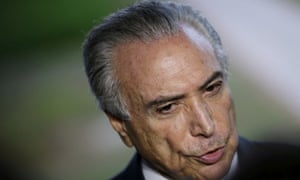
Brazil: explosive recordings implicate President Michel Temer in bribery
Street
protests and calls for impeachment as prosecutors are handed tapes of
discussions about hush-money payments to jailed powerbroker Eduardo
Cunha
President
Michel Temer is heard on tape discussing bribes, according to reports
in Brazil. Photograph: Ueslei Marcelino/Reuters
Thursday
18 May 2017 04.23 BSTLast modified on Thursday 18 May
2017 04.41 BST
Angry
crowds and outraged members of Brazil’s congress have demanded the
impeachment of President Michel
Temer following
reports he was secretly recorded discussing hush money pay-offs to a
jailed associate.
The
tapes were presented to prosecutors as part of a plea bargain by
Joesley and Wesley Batista, brothers who run the country’s biggest
meat-packing firm JBS, according to O Globo newspaper.
They
are said to contain conversations that incriminate several leading
politicians, including the former presidential candidate Aecio Neves
and the former finance minister Guido Mantega.
Temer
is alleged to have talked with Joesley about cash payments to Eduardo
Cunha, the former speaker of the House who has been jailed for his
role in the sprawling Petrobras corruption scandal.
Brazil's corruption inquiry list names all the power players – except the president
Read
more
Cunha
is in the same ruling Brazilian Democratic Movement party as Temer
and initiated the impeachment of Dilma Rousseff that allowed him to
take over the presidency. He has alluded to the many secrets he knows
about his former colleagues.
In
covert recordings made during two conversations in March, Joesley
tells Temer he is paying Cunha to keep him quiet, to which the
president allegedly replies: “You have to keep it going, OK?”
According
to Globo, police also have audio and video evidence that Temer’s
aide Rocha Loures negotiated bribes worth 500,000 reais (US$160,000)
a week for 20 years in return for helping JBS overcome a problem with
the fair trade office.
Planalto,
the presidential palace, issued a statement denying the claims:
“President Michel Temer never solicited payments to obtain the
silence of former deputy Eduardo Cunha. He neither participated nor
authorised any activity with the objective of preventing testimonies
or cooperation with justice officials by the parliamentarian.”
No
audio or transcripts were released. The supreme court has refused to
comment on the validity of the alleged leak – but the news has
enraged the public. Shouts and pot-banging (a traditional form of
protest in Latin America) could be heard when the allegations were
aired on TV. Crowds also gathered outside the presidential palace
chanting “Fora Temer” (Temer out). Two congressmen submitted
impeachment motions in the lower house.
Politics
is likely to become more paralysed – even before the latest claims
Temer’s administration was in crisis. Three of his ministers have
been forced to resign and eight others are implicated in the lava
jato (car
wash) corruption investigation.
The president’s approval ratings have fallen to single digits, the
economy remains mired in recession and opponents recently organised a
general strike in protest at his austerity policies and proposed
changes to pension, labour and environmental laws. The possibility of
Brazil unseating another president has moved closer, though the
ruling coalition has a large majority in Congress.
The
JBS allegations also threaten one of his most powerful allies.
Joesely Batista is said to have recorded senator and former
presidential candidate Aecio Neves of the centre-right Brazilian
Social Democratic party requesting two million reais in bribes.
According to Globo, federal police filmed the payment to the
senator’s cousin. The money was then tracked to a bank account of a
company belonging to Zeze Perrella, who – like Neves – is a PSDB
senator from Minas Gerais.
It
is not the first time Perrella has been linked to crime. In 2013 a
helicopter belonging to his son Gustavo was seized by police with 445
kilograms of cocaine on board. Only the pilot was arrested.
None
of the major parties looks set to emerge unscathed from the plea
bargain by JBS. Guido Mantega, finance minister in the last Workers
party government, has also allegedly been accused of accepting cash
in return for lobbying on behalf of JBS with the Brazilian National
Development Bank.
Since you’re here …
…
we
have a small favour to ask. More people are reading the Guardian than
ever, but far fewer are paying for it. Advertising revenues across
the media are falling fast. And unlike
many news organisations, we haven’t put up a paywall – we want to
keep our journalism as open as we can.
So you can see why we need to ask for your help. The Guardian’s
independent, investigative journalism takes a lot of time, money and
hard work to produce. But we do it because we believe our perspective
matters – because it might well be your perspective, too.
If
everyone who reads our reporting, who likes it, helps to support it,
our future would be much more secure.
Nenhum comentário:
Postar um comentário